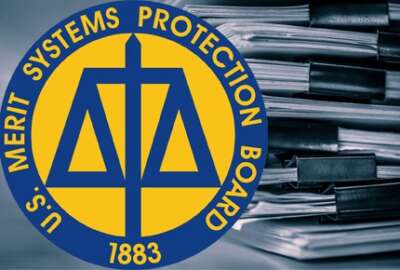
That Senate confirmation process seems slower than ever — especially at one agency
The Senate has confirmed 127 of the 346 people President Joe Biden has nominated so far for political positions. For some federal employees, the lack of action on...
The Senate, after approaching the second week of August in their usual late-night, college student procrastinator fashion, left town for the rest of the summer.
With the Senate gone until Sept. 13, it’s always a good time to take stock of what’s left on Congress’ agenda, especially in the first seven months of the president’s term.
I’ll save the annual budget process and the threat of a government shutdown for another time. Like most years, Congress is woefully behind on the business of funding the government for next fiscal year. And yes, the deadline to avoid a shutdown is still Sept. 30.
Instead, let’s check in on another Senate responsibility.
Of the 346 people President Biden has picked to fill positions requiring Senate-confirmation, 127 of them have made it through that process.
According to an appointment tracker from the Partnership for Public Service and the Washington Post, another 206 nominees are sitting somewhere in the Senate-confirmation process. Another 13 people haven’t been formally nominated by the president.
All told, about 1,200 out of roughly 4,000 political appointee positions require Senate confirmation.
Yes, Biden’s cabinet is fully staffed. And the 15 main cabinet departments all have confirmed deputy secretaries to match. The Office of Personnel Management at last has a permanent leader, as does the General Services Administration.
A glaring vacancy at the Office of Management and Budget remains, where the president still hasn’t nominated a permanent director.
The number of positions requiring Senate confirmation has increased by 59% in the last several decades, from 779 in 1960 to 1,237 in 2016, according to the Partnership for Public Service.
And data shows the Senate-confirmation process itself — from start to finish — is taking longer in recent years.
The Senate confirmation process took an average of 117 days during the Trump administration and 112 days during the Obama administration, according to a recent Partnership report. That’s about twice as long as the average Senate confirmation process during the Reagan administration of 56 days.
On one hand, the absence of a political appointee doesn’t make too much of a difference in most employees’ daily work lives. Most feds interact with their supervisors and managers directly above them, maybe a boss’s boss on occasion.
The lack of confirmed political appointees maybe has the most impact on career senior executives, who often step into the roles on an acting basis until the Senate can clear permanent nominees.
But perhaps the most glaring political absence for feds right now is at the Merit Systems Protection Board, which, in case you haven’t heard, hasn’t had a quorum for more than four years. It hasn’t had a single member since March 2019.
President Biden tapped Cathy Harris and Raymond Limon to fill two out of three spots on the board, enough to restore a long-awaited quorum. Neither have made it past the Senate Homeland Security and Governmental Affairs Committee, the first stop in the confirmation process.
President Trump nominated three members by the end of his term, but the Senate confirmed none of them by the end of his presidency, likely due to a variety of political reasons.
Now, the board has a backlog of 3,365 pending appeals, otherwise known as petitions for review, awaiting action.
Over the course of the last four years, I’ve received emails and phone calls from federal employees who have cases pending before the board and are extraordinarily frustrated. Many of them say they’re whistleblowers and are looking for justice, or — at the very least — some sense of finality with their cases. Many of them have been in limbo for longer than four years.
The status of the MSPB is clearly a disappointment. Former MSPB executives and attorneys that I’ve spoken to predicted the board could return to action by the early fall, if the president nominated at least two new members and the Senate confirmed them before the August recess.
Of course, that hasn’t happened, and it’s unlikely to with the Senate out through Sept. 13.
Plus, the board faces another potentially dire situation.
A recent opinion from the Court of Appeals for the Federal Circuit strongly hinted that it’s closing in on a decision on McIntosh v. Department of Defense, which will decide whether the board’s judges are “principal officers” who need to be appointed by the president and confirmed by the Senate in order for their decisions to be binding on any federal agency.
The answer to that question is especially important at the present moment without any board members, let alone a quorum that can make official decisions.
Under normal circumstances, a quorum of the MSPB’s Senate-confirmed members could theoretically give the board’s blessing to the decisions its judges have already made en-masse, even if the court determines those judges’ decisions can’t stand on their own because they were never properly appointed.
But that scenario is in jeopardy given the board’s current situation. So the current situation begs the question: Will the courts or the Senate — both traditionally slow-moving beasts — act first?
Nearly Useless Factoid
Members of the weasel family, including ferrets, perform what’s known as the “weasel war dance,” hopping, twisting and darting around prey to disorient and possibly even hypnotize them while subtly moving close enough for a kill.
Source: National Park Service
Copyright © 2025 Federal News Network. All rights reserved. This website is not intended for users located within the European Economic Area.
Nicole Ogrysko is a reporter for Federal News Network focusing on the federal workforce and federal pay and benefits.
Follow @nogryskoWFED
Related Stories

Complex appointments clause challenges throw some MSPB cases in limbo




